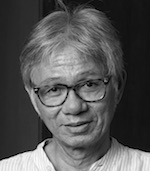 When Rodrigo Duterte warned early in his presidency that he might suspend the writ of habeas corpus to allow for arrests without warrants, human rights lawyer Chel Diokno remarked, “The train may have left the station.”
When Rodrigo Duterte warned early in his presidency that he might suspend the writ of habeas corpus to allow for arrests without warrants, human rights lawyer Chel Diokno remarked, “The train may have left the station.”
Duterte’s reputation as a strongman credibly preceding him, Diokno would not be caught missing any signs, as his father did in his own time.
Senator Jose Diokno, one of the sharpest critics of Ferdinand Marcos, doubted that Marcos would make good his threat to impose martial law, something never experienced, after all, in this postwar republic. On the very night it happened, in September 1972, Diokno was arrested at home and thrown into prison, there to languish for two years.
Now his son’s own fear has become real; Duterte’s martial-law train has set off on its initial run, in the south, across Mindanao, one of the country’s 3 main island groups.
Mindanao has been a hotbed of brigandage, rebellion, and other forms of syndicated criminality. To Duterte, all that constitutes terrorism, the modern-day scourge plaguing the world, and obviously he feels that the local situation has worsened to a point where normal presidential powers no longer work.
In fact, Mindanao had been under a “state of emergency” since September, after two bomb explosions killed 14 people in a night market in Davao City, where Duterte presided as mayor for more than two decades and built a reputation for death-squad justice. The emergency allows the army to come in and reinforce the police, but for Duterte that was not good enough; and neither a mere suspension of the privilege of the writ of habeas corpus, which comes next in severity. He decided to go straight to martial law, which encompasses all emergency measures.
And as if the idea of a standard martial law were not dreadful enough, he warned he would be“harsh” with it. He further warned he would widen its coverage if the enemy could not be subdued or contained within Mindanao.
In fact some of the enemy has spilled into the next island group, the Visayas, driven across the sea to Bohol province by troops taking part in an offensive mounted in the Mindanao province of Lanao del Sur and concentrated on its capital, Marawi City, shortly before the declaration of martial law. How martial law for all of Mindanao could be justified by a provincial-city problem is a question Duterte has not begun to answer. (Only a few days ago in Manchester, England, a suicide bomber left 22 instantly dead, and the police have been getting results with normal powers.)

Out here in Luzon, right in Metro Manila, mysterious bombs are exploding in public places, although causing no deaths or serious injuries, and police alerts to equally mysterious bomb threats are being sounded.
These questions and mysteries raise reasonable and critical suspicions of pretexts (for Marcos’ martial law it was the stage-managed ambush of Juan Ponce Enrile) – reasonable and critical, indeed, considering the personal freedoms (of expression, public meetings, movement) and rights (the right to know, for one) to be lost to martial law. Why, martial law hijacks democracy itself!
Questions must be asked now, before the freedom to ask is itself lost. Alas, the precise organization expected to do that – probe for truth and justice – is defaulting. The leadership of the Integrated Bar of the Philippines, the national organization of lawyers, is suddenly, momentarily blind: it “sees no reason to question the declaration [of martial law] at this time.”
One reaction might be consoling if it did not come from the Speaker of the House. He says its members will review the declaration, but does not have to say – for it goes without saying – that it will be found, in the House’s sycophantic phraseology, “perfect in form and substance.” The Senate is just as useless as a counterweight; at least its majority, just as overwhelmingly for Duterte as in the House, has so far preferred to be prudently quiet.
As for the Supreme Court, anyone who has been keeping score should have an idea where it stands; one of its last important votes might be, by itself, enough indication: it gave Ferdinand Marcos, Duterte’s professed idol, a hero’s burial.
But where exactly is Duterte going with his martial law? For a quick, quantified idea: in Marcos’ 14 years of martial law, there were 75,000 documented cases of torture; in less than a year of Duterte’s war on drugs, undertaken yet with non-martial-law powers, there have been more than 7,000 deaths. – Rappler.com